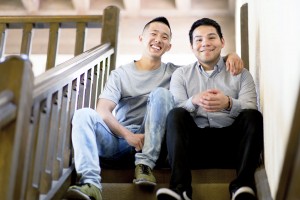Some friends finish each other’s sentences, but Alberto Loaiza and Kevin Yang finish lines of each other’s poetry.
Loaiza, a fourth-year English and Chicana/o studies student, and Yang, a third-year world arts and cultures and African American studies student, are two of four members of UCLA’s slam poetry team and staff members for The Word on Wednesday, the Cultural Affairs Commission’s open-mic poetry group. On April 6, they competed in the College Unions Poetry Slam Invitational at University of Texas at Austin, placing fifth out of 68 competitors.
Loaiza and Yang, who will both graduate in spring, were only acquaintances prior to CUPSI. While preparing for the competition, the two said they formed a closer friendship that allowed them to grow as poets and realize their ability to speak on behalf of the marginalized Latino and Asian communities they represent, respectively.
Loaiza learned English at the age of 8 when he moved from Veracruz, Mexico, to the Watts neighborhood of Los Angeles. In high school, he received no grade higher than a C in any of his English classes, he said.
Creative writing was always a hobby for Loaiza, but he said it wasn’t until one of his personal essays brought a community college professor to tears that he began to pursue slam poetry. Still, Loaiza said he never won his community college’s slam poetry nights, receiving only an honorable mention for stage presence.
“My poetry wasn’t good on paper, but my performance was all in,” Loaiza said.
Loaiza tried out for the UCLA CUPSI team in the fall of 2015, but was eliminated both times. It was only in March, when multiple members of the 2016 team had dropped out, that the team recruited Loaiza to meet CUPSI’s four-member requirement, he said.
Across the world from Loaiza, Yang was born in Southeast Asia, then adopted and raised in Barbados. He attended a boarding high school in England, where he said his introduction to poetry was focused on traditional, white poets like Shakespeare and Edgar Allan Poe.
“I felt like poetry was an elite thing, rather than a people’s art,” Yang said. “It was for people who wanted to be like, ‘Look at us, we’re all about art.’”
At UCLA, Yang accompanied a friend to a poetry competition and heard a poem called “Lessons on Loving an Absent Father.” Yang said the poem resonated with his fatherless upbringing, sparking his interest in spoken word poetry.
Yang joined The Word on Wednesday staff as a second-year and made it onto the CUPSI team in fall 2015 after his second try, he said.
In the weeks leading up to CUPSI, the team members spent up to 13 hours per day exchanging life stories to discover shared experiences for group poems, said Hayley Downs, a third-year English student and CUPSI team member. The teammates often talked until the early hours of the morning, occasionally sleeping over at one another’s apartments, she said.
One night Downs and Yang stocked up on food from Ralphs and shut themselves in Yang’s apartment until 4 a.m. to discuss topics such as their families, interests and anxieties, Downs said.
“We just had to throw out any boundaries because we didn’t have time to follow the natural progression of a friendship,” Downs said. “It was like, ‘I need to know everything about you right now.’”
The team bonding process allowed Yang and Loaiza to form a mutual sense of trust, Yang said, and the two disclosed secrets and shameful things they felt about themselves.
Loaiza said one shared point of shame was the sense of indignity the two felt growing up as people of color in America. He and Yang traded experiences into the early morning, drawing out each other’s memories of microaggressions and harmful stereotypes, he said.
Yang, for example, said people were often surprised when they discovered he dabbles in spoken word poetry and college sports, and Loaiza said he faced the same reaction when people heard he took Advanced Placement classes in high school.
Yang and Loaiza poured their experiences into a joint slam poem about racial identity called “People of Shame.”
“When we wrote our CUPSI poems, our goal was, ‘What story can we tell that no one else can tell?” Downs said. “Being people of color who aren’t black is a narrative you don’t often hear in slam poetry.”
Yang said he initially lacked the bravery to write about himself, and chose to write about the universal emotion of love. He said he refused to explore his identity crisis as an Asian-born Barbadian in England and denied responsibility to his heritage.
Through CUPSI, Yang said he met Southeast Asian poets who felt their voices are not heard in the poetry community. Yang realized he could reflect on social issues in front of a willing audience, and felt it was his duty to serve the communities he represents, he said.
“Poetry is going to be political if you really care about the message you carry,” Yang said. “It’s about how raw you can go inward before you can look outward.”

During the writing process, Loaiza and Yang adapted to one another’s writing styles, benefitting from the other’s strengths as a result. Yang’s forte is metaphors, Loaiza said, which helped him layer his writing with poetic devices that can draw in the audience. Loaiza said his favorite metaphor from “People of Shame” is his comparison of the Los Angeles Latino community with “the first hit off an ice cold Mexican coke.”
Yang said Loaiza’s direct and straightforward approach to writing poems kept him from getting lost in obscure metaphors.
Downs noticed Loaiza’s easygoing personality also balanced Yang’s anxious and self-critical tendencies, she said.
“(Loaiza) is very good for (Yang),” Downs said. “(Yang) just needed someone in his life to tell him to relax.”
Michelle Portillo, a fourth-year political science and Chicana/o studies student and the director of The Word on Wednesday, said Loaiza’s edge in slam poetry has always been his enthusiasm. Even when Loaiza first came to The Word, he masked his nerves with a loud and proud voice, she said.
“It’s a good balance,” Portillo said. “(Loaiza) pulls (Yang) into his confidence with him, and (Yang) has definitely stepped out of his shadow and towards the mic to tell his story the way it should be told.”
After graduating in June, Loaiza will teach high school English for Teach for America in Las Vegas starting in the fall.
Although he is walking in graduation, Yang plans to stay at UCLA for two more quarters. He said he will serve as co-director of The Word and continue his internship at photography studio Graphics Metropolis.
Both Loaiza and Yang said they will continue writing poetry. The poets hope to compete individually in National Poetry Slam, the largest-scale poetry competition in the United States.
“I write because a poem is never completely done,” Loaiza said. “It reminds me I don’t have to be either.”
